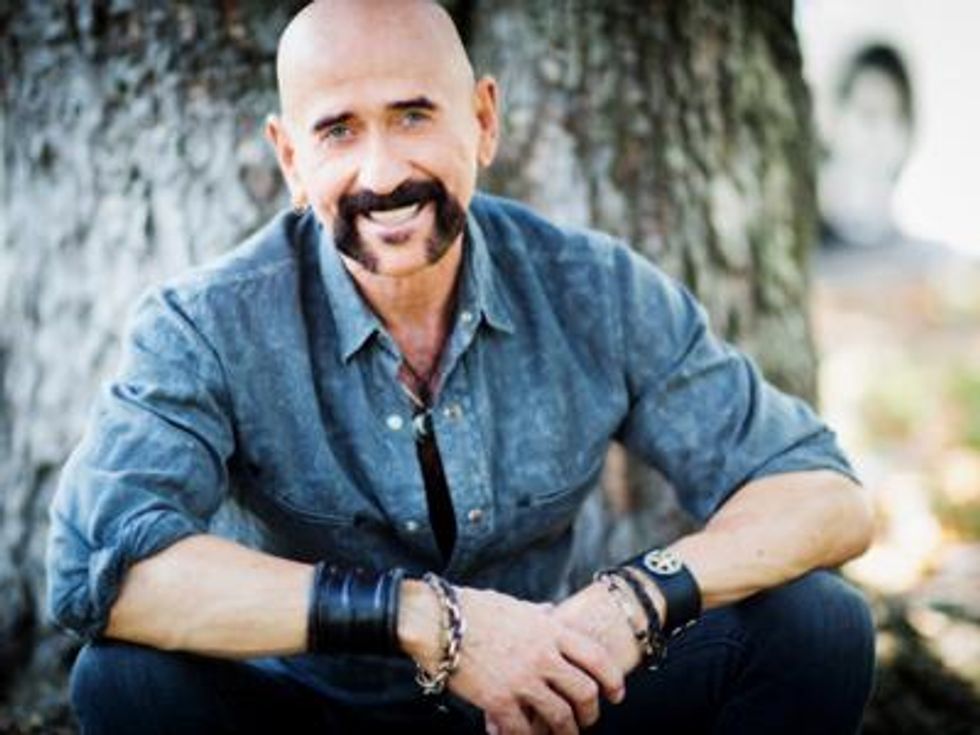
Country music crooner Jimbeau Hinson is back with a new album and a new outlook on being bisexual and HIV-positive.
January 14 2013 2:30 PM EST
May 26 2023 1:25 PM EST
By continuing to use our site, you agree to our Private Policy and Terms of Use.

Jimbeau Hinson found success in Nashville in the 1990s, writing songs for artists such as Patty Loveless and the Oak Ridge Boys. But at the height of his career in the mid ’90s, Hinson’s HIV, which he was keeping secret, caught up with him and he fell into a coma. His status as an HIV-positive man—he came out as bisexual in the ’70s—was revealed to the country music industry. But instead of turning their backs on him, Hinson’s peers embraced him, and the songwriter’s health slowly improved. Hinson, who’s been with his wife, Brenda, for over 33 years, recently released his debut album, Strong Medicine, which chronicles his relationship not just with his wife but also with HIV.
Why was this a good time to release your first album?
I started writing a book about my life about around 18 years ago. I was living with the secret of my infection for about 12 years and figured if I could just write it down on paper, it could be good therapy. I was in L.A. visiting a friend who’s a guitar player for Lyle Lovett, and after dinner one night, I pulled out my computer and read her a portion of my book. We laughed and laughed. She used to be a literary agent and said this was the greatest thing she’s read since Catcher in the Rye or Confederacy of Dunces. She encouraged me to work on the book more, so I spent the next couple years getting it in some form. I had a rough draft and read it to a friend, Sandy Knox, and we sat down, passed a box of Kleenex around, and laughed and cried. She called six or seven months later and said, “I want to start a record label. I want to put your story out. I want to do an album centered around your story. I think the world needs to hear this.” It all came about from my little therapy project 18 years ago.
Does the title have a double meaning?
I’ve known Sandy for 20, almost 30 years. She’s one of the few that knew of my infection and she wanted to go back and dig up songs from the past. Much of those songs I wrote back in the 1980s when I was dealing privately with my infection. The song “Not You Again” is definitely about my infection. The album is a collection of things that were thinly veiled. They’re songs of inspiration and fortitude and not giving up and forgiveness and monogamy—all the lessons I’ve learned through this journey.

The music business had always had a lot of gay people in it. [In the ’80s] there were a lot of gay people in the industry, they just weren’t out. Being LGBT or HIV-positive, it wasn’t like a curse or an unacceptable thing in country music, but to the audience it was quite taboo. They had to walk that line. I remember a meeting in the ’80s for a committee and someone asked if we should support an AIDS benefit for kids and everyone said, “No, no. We don’t want our name associated with that.” That told me a lot. I thought, Maybe I should keep this a secret. There was definitely that element of fear going on in the ’80s. Nowadays I think the whole nation has opened up a lot more, not just the music business. Hallelujah.
So it wouldn’t be hard to stage an AIDS benefit in Nashville now?
It’s come full circle. Now the younger generation doesn’t think it’s anything to be gay at all. They don’t see anything wrong with it. They also don’t think it’s anything to be HIV-positive, because they think it’s simply a chronic disease. No one’s talking about how you have to change your entire lifestyle around pills. It’s not that hard to prevent yourself from catching it and you should prevent yourself from catching it. That’s one of the main reasons I wanted to do this project—I wanted to talk about the things nobody’s talking about. My doctor was recently awarded an honor, and [at the ceremony] 20-year-olds were getting up and talking about their recent infection. I was floored.
You’re a bisexual man married to a woman. Do you field a lot of questions about that?
Most people don’t talk about bisexuality, so I do get questions. They’re mostly polite questions, no one’s rude about it. I’m just a married man now. I had three male lovers and I married a woman and have been married to her for 33 years. I grew up and found someone I love to be with. I’m 61, I don’t want to be out there, like some of my friends, chasing 20-year-olds. I love my life. I love my wife. If I was with a man, I’d be the same way and settle down with one person.
Have you worked out all the kinks that go along with being in a serodiscordant relationship?
My wife’s healthy and always has been. You just have to stay on top of it and be careful. Condoms and Clorox are cheaper than these pills I have to take. I personally work out three or four days a week and eat real food, not overprocessed stuff. And I keep positive people around me. Having a positive frame of mind is one of the most important ways to deal with life, period. I mean, at 61, I’ve outlived a lot of people who thought they’d outlive me.